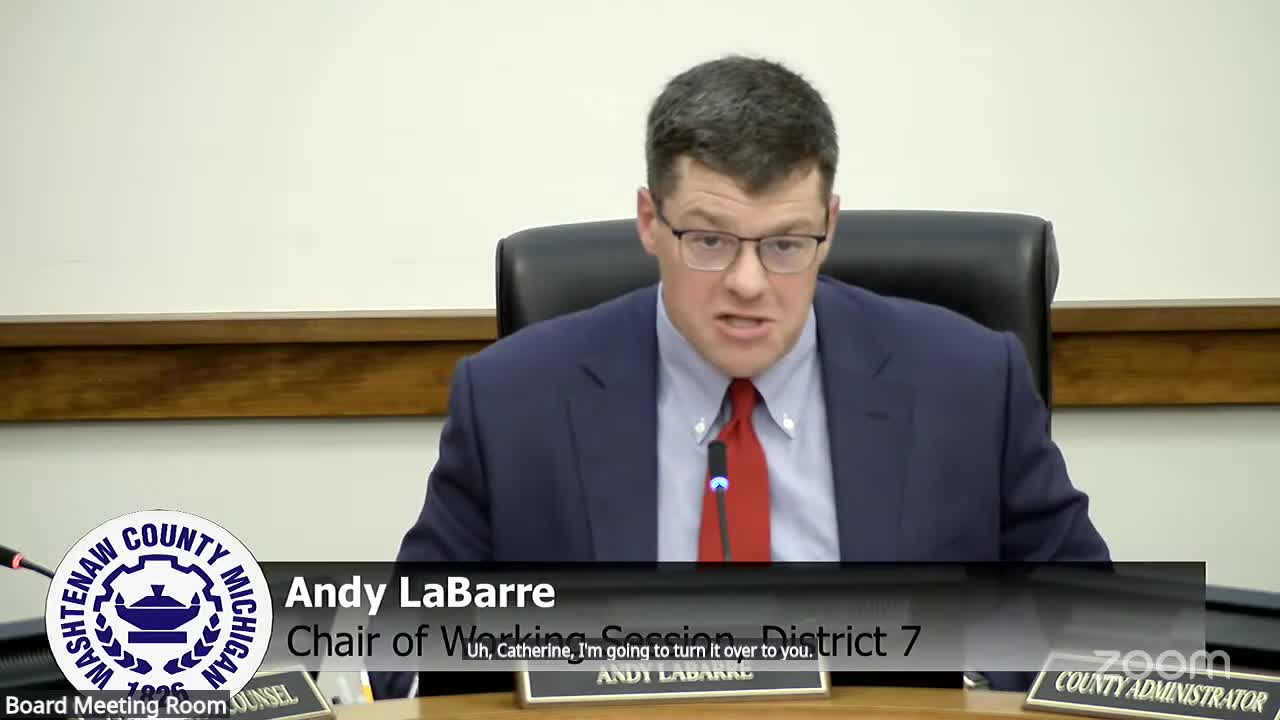Washtenaw County releases 2026–29 general fund recommendations; commissioners spar over animal‑control funding
Get AI-powered insights, summaries, and transcripts
Subscribe
Summary
County finance staff presented a recommended 2026–29 general fund budget and commissioners used the session to press administration for clearer accounting and options on the county’s $2 million animal‑control contract.
County finance staff presented a recommended 2026–29 general fund budget at the Oct. 15, 2025 Washtenaw County Board of Commissioners working session, and commissioners used the presentation to press administration for clearer cost accounting on animal control services and other county priorities.
The numbers: county staff summarized a general‑fund starting point of about $166 million in 2026, rising to roughly $176 million by 2029. The recommended assumptions include a 3% increase in the general‑fund operating millage base for 2026 (then a return to smaller increases in subsequent years), a reduced attrition assumption based on 2025 experience, and continued contributions to reserves with projected year‑end fund balance above policy targets (projected at roughly 41% of the 2026 budget and declining toward 35% by 2029 under the recommendation).
Major budget items called out by staff included: - Reclassifications: 219.5 FTEs recommended for reclassification through the county’s job‑and‑classification review (JAQs), with an estimated general‑fund cost of about $800,000 in 2026 growing in future years. - Public safety: requests to increase jail food and medical funding (the recommendation includes roughly $1.6 million in 2026 and grows to about $2.0 million by 2029); county staff said the state budget included roughly $363,000 in revenue‑sharing that must be applied to public safety and will offset part of the request. - Internal operations: cybersecurity enhancements, a contracts‑management system upgrade (OnBase replacement funding partly drawn from dormant internal funds), and modest additions in elections staffing and equalization to address workload. - One‑time/nonstructural asks: up to $3 million recommended from fund balance for county bicentennial activities and an allocation to begin winter shelter funding; staff said recommended contributions to fund balance would smooth later‑year demands.
Animal control and Huron Valley Humane Society contract: the largest public exchange during the presentation concerned the county’s relationship with the county‑level provider for animal control services. Commissioners said the county currently pays about $2 million annually under the Humane Society contract, and staff reported limited cost recovery from local units. Administrator Dill said staff are actively discussing cost‑sharing with municipalities and that there has been “no direct pressure placed on any of our municipalities” but that the county is seeking voluntary contributions to reduce the county subsidy.
Several commissioners pressed for a formal county position and better accounting: - Commissioner Light urged immediate action: “We need to cut the contract,” she said, arguing the county should not continue a high subsidy without a clear cost breakdown. - Commissioner Robbie urged clarity about statutory obligations and cost allocation, saying the county’s legal responsibilities are limited and that local ordinances and licensing revenue may explain why communities seek county support; he asked for a per‑animal cost model and suggested the board set policy for chargebacks to municipalities. - Administrator Dill said the county will continue negotiations with local jurisdictions, provide updated data and bring options back to the board; county counsel said she will circulate a written legal opinion on municipal obligations to the board.
Other budget discussion highlights: several commissioners asked for more granular departmental detail (for example, clarity about sheriff’s office mandated versus discretionary costs), and staff identified areas where requested operational needs could not be met in full. Staff also noted programmatic requests not funded in the recommended budget, including the Youth Assessment and Resource Center presentation made earlier in the session.
Votes at a glance: the working session included several formal consent‑agenda votes earlier in the meeting. The board approved the day’s consent agenda items, including (a) a resolution establishing the Washtenaw County Space Plan Steering Committee (adopted after an amendment; one commissioner abstained on the space‑plan bylaw wording), (b) a resolution recognizing Washtenaw County WIC for a federal breastfeeding award (adopted unanimously), and (c) approval of claims and contracts (adopted unanimously). The meeting record shows the board approved the measures by roll call with a single abstention noted on the space‑plan bylaw language.
What’s next: staff will return with additional detail and options. Administrator Dill and finance staff offered to supply commissioners with per‑jurisdiction animal intake and cost data, and county counsel will circulate a legal opinion on municipal obligations. Commission discussion signaled an appetite for a longer conversation and possible formal policy direction about cost‑sharing, contract renegotiation or alternative service models.
Speakers quoted or referenced in this article are listed in the attached speaker list below.
